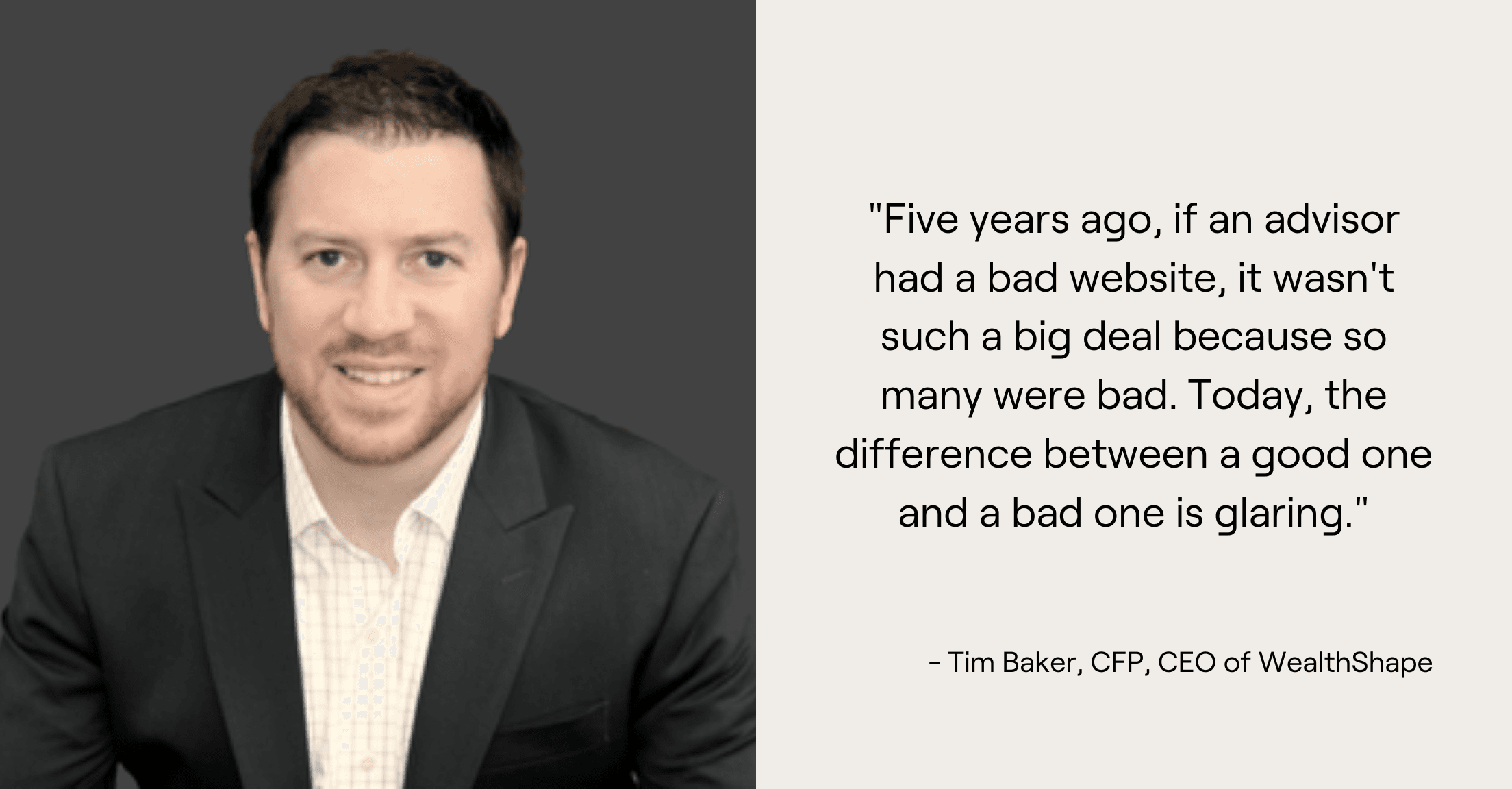
Timothy Baker, CFP® founded WealthShape after spending more than a decade traveling across the United States, helping investors from all walks of life to understand the benefits of disciplined investing, the importance of planning, and above all, the significance of focusing on the things they control to improve the quality of life.
Why is an advisor’s website so important?
Your physical address used to mean everything. Now your web address and the value you convey through it is far more important. It’s about the experience and the need to stay engaged. New clients come from a multitude of different places. At a time when so much information is a simple Google search away, every advisor should automatically assume they will be thoroughly vetted. You don’t get a second chance at a first impression, so if your website is terrible, the chance of moving on to next guy is huge.
It’s 2016, and there’s no excuse for low-quality content. The tools that are available today are vastly improved. There are numerous, easy-to-use turnkey solutions now available. Web design companies like Wordpress, SquareSpace, Weebly, etc. all make it easy to establish a sharp looking interactive website.
What should an advisor consider when creating a website?
If you are a solo practitioner, you need to have a site that looks professional, is easy to navigate and conveys your value proposition quickly and efficiently. Beware of templated websites. If 10 people in your office have the same look-and-feel to their website, search for other options. You typically see this with broker-dealers, who like to have greater control over their reps' marketing and public-facing content. With RIAs, I often come across websites that look like they haven’t been updated in years. Not everything has to jump off the screen, but it at least has to hold the readers' attention long enough to put your firm into consideration.
Naming your website matters. If your domain is something like www.capital-asset-management-incorporated.net, you may want to rethink a couple of things. The shorter the better, dashes are usually confusing and no one remembers .net, .biz, or .co addresses. Think about a client having to type all that just to send you an email. There’s no rule of thumb for length, but I will say if the name is longer than 20 characters before the .com, it better be memorable. A tip: The GoDaddy app is your friend. Check for availability when you come up with a new site name.
Why is it so important for an advisor to articulate their value proposition on their website?
Good value propositions differentiate you from the herd. Bad ones make you sound like every other advisor on the planet. In simplest terms, it should broadcast who you are, what you do, and who you do it for. Think about your client base, your demeanor or method of communication, your investment methodology etc. It should be more descriptive than “I’m a comprehensive financial planner who works with clients in the greater Boca Raton area.” There are probably 50 advisors just like that within earshot. This one takes some time and should remain consistent not only with your website, but also when introducing your services in person.
Should advisors put fees or a pricing schedule on their website?
Admittedly, there are differences of opinions on this one. I think we have come to the point where transparency is a must. Every industry has fees and clients understand that. What they hate most about our industry is not knowing them. The initial fear for most advisors is that it will scare prospects away. I would argue that there are enough alternatives available to disregard your services all together purely out of search inconvenience or lack of transparency.
How do you use social media and your website together?
I use social media for a lot of things, but a huge reason is to drive traffic to my site. Social media should also interact with your site. Twitter, LinkedIn and Facebook posts should be consistent. A great free way to keep track of and coordinate your efforts is by using Hootsuite.
If you don’t know how to do something, hire someone!
Don’t spin your wheels if web design isn’t in your repertoire. If you have lackluster writing ability, outsource it to someone else. One thing is for certain: content and messaging are everything. We’ve recently seen some of the biggest regulatory changes in decades and the public has taken notice. Heightened exposure like this causes a whole lot of people to take another look at their advisory relationships. Whether you’re the victim or the benefactor of change, your web presence may matter more now than it ever has.